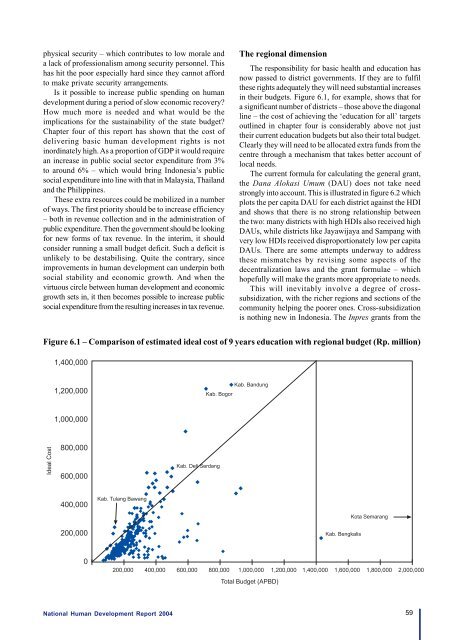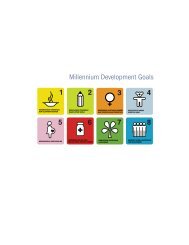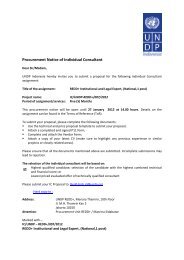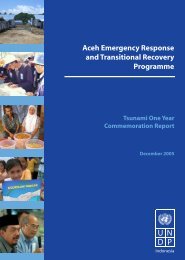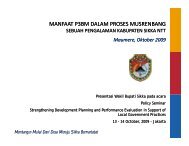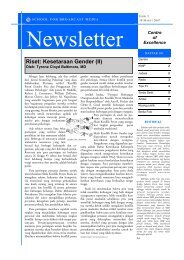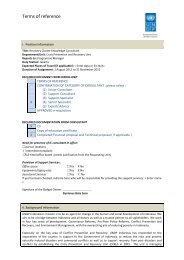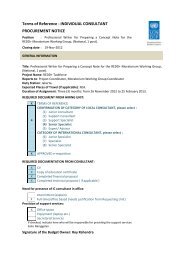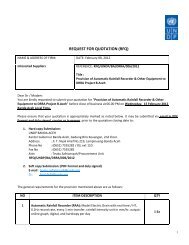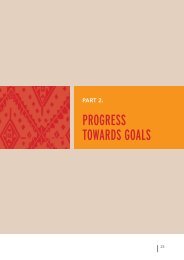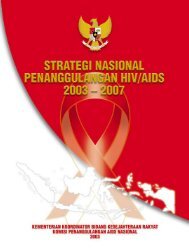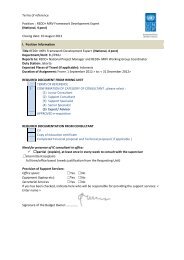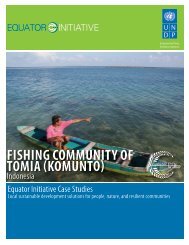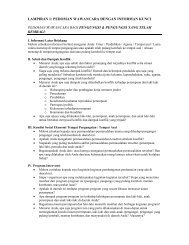Download the Indonesia Human Development Report 2004. - UNDP
Download the Indonesia Human Development Report 2004. - UNDP
Download the Indonesia Human Development Report 2004. - UNDP
You also want an ePaper? Increase the reach of your titles
YUMPU automatically turns print PDFs into web optimized ePapers that Google loves.
physical security – which contributes to low morale anda lack of professionalism among security personnel. Thishas hit <strong>the</strong> poor especially hard since <strong>the</strong>y cannot affordto make private security arrangements.Is it possible to increase public spending on humandevelopment during a period of slow economic recovery?How much more is needed and what would be <strong>the</strong>implications for <strong>the</strong> sustainability of <strong>the</strong> state budget?Chapter four of this report has shown that <strong>the</strong> cost ofdelivering basic human development rights is notinordinately high. As a proportion of GDP it would requirean increase in public social sector expenditure from 3%to around 6% – which would bring <strong>Indonesia</strong>’s publicsocial expenditure into line with that in Malaysia, Thailandand <strong>the</strong> Philippines.These extra resources could be mobilized in a numberof ways. The first priority should be to increase efficiency– both in revenue collection and in <strong>the</strong> administration ofpublic expenditure. Then <strong>the</strong> government should be lookingfor new forms of tax revenue. In <strong>the</strong> interim, it shouldconsider running a small budget deficit. Such a deficit isunlikely to be destabilising. Quite <strong>the</strong> contrary, sinceimprovements in human development can underpin bothsocial stability and economic growth. And when <strong>the</strong>virtuous circle between human development and economicgrowth sets in, it <strong>the</strong>n becomes possible to increase publicsocial expenditure from <strong>the</strong> resulting increases in tax revenue.The regional dimensionThe responsibility for basic health and education hasnow passed to district governments. If <strong>the</strong>y are to fulfil<strong>the</strong>se rights adequately <strong>the</strong>y will need substantial increasesin <strong>the</strong>ir budgets. Figure 6.1, for example, shows that fora significant number of districts – those above <strong>the</strong> diagonalline – <strong>the</strong> cost of achieving <strong>the</strong> ‘education for all’ targetsoutlined in chapter four is considerably above not just<strong>the</strong>ir current education budgets but also <strong>the</strong>ir total budget.Clearly <strong>the</strong>y will need to be allocated extra funds from <strong>the</strong>centre through a mechanism that takes better account oflocal needs.The current formula for calculating <strong>the</strong> general grant,<strong>the</strong> Dana Alokasi Umum (DAU) does not take needstrongly into account. This is illustrated in figure 6.2 whichplots <strong>the</strong> per capita DAU for each district against <strong>the</strong> HDIand shows that <strong>the</strong>re is no strong relationship between<strong>the</strong> two: many districts with high HDIs also received highDAUs, while districts like Jayawijaya and Sampang withvery low HDIs received disproportionately low per capitaDAUs. There are some attempts underway to address<strong>the</strong>se mismatches by revising some aspects of <strong>the</strong>decentralization laws and <strong>the</strong> grant formulae – whichhopefully will make <strong>the</strong> grants more appropriate to needs.This will inevitably involve a degree of crosssubsidization,with <strong>the</strong> richer regions and sections of <strong>the</strong>community helping <strong>the</strong> poorer ones. Cross-subsidizationis nothing new in <strong>Indonesia</strong>. The Inpres grants from <strong>the</strong>Figure 6.1 – Comparison of estimated ideal cost of 9 years education with regional budget (Rp. million)National <strong>Human</strong> <strong>Development</strong> <strong>Report</strong> 2004 59


